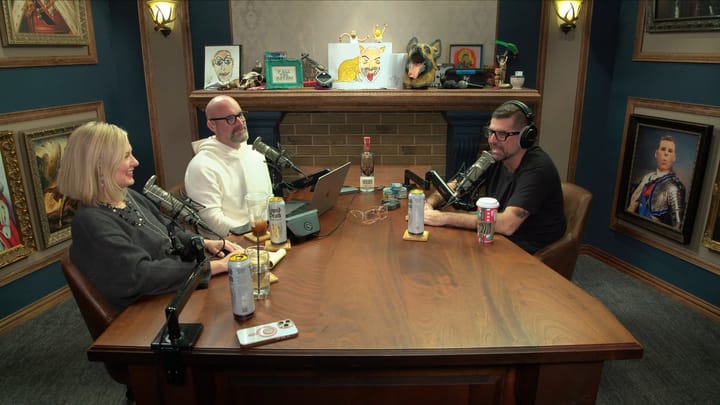Tom Segura Is Radicalizing Right In Front Of Us
A misogynist Twitter rant reveals something deeper about the red-pilled comedian.

This week the comedian Tom Segura got very upset with a flight attendant for, apparently, asking him to gate-check his bag before a flight. In response to this minor inconvenience he unleashed the full power and potential of his “comedian’s mind”:
Dumb cunt from @AmericanAir made me gate check my bag so she feels the little power she has in her life. I get it. You win this round, cunt.
— Tom Segura AKA Mr. Ladybug (@tomsegura) October 5, 2023
Some get mad when people vent online at their airline frustrations but honestly it's a healthy outlet. Think of the alternatives: writing is probably the best option. You get the emotions out, get some validation and can fantasize that Ol' Cunt face sees what your wrote
— Tom Segura AKA Mr. Ladybug (@tomsegura) October 5, 2023
This is a psychological tactic that well-trained people across all businesses use because it's effective. They empathize with the customers emotion. Typically people feel seen and heard and immediately calm down after this acknowledgment. I still wish awful things on gate agent https://t.co/p7rSlbQ2Sc
— Tom Segura AKA Mr. Ladybug (@tomsegura) October 5, 2023
All the poors and losers have the same response "ohhh you were inconvenienced well you should accept it. That's what me and my dumb poor family have done for generations"
— Tom Segura AKA Mr. Ladybug (@tomsegura) October 5, 2023
This is why you're a Poor.
Poor 👇🏼 https://t.co/pW7pRPUd2s
— Tom Segura AKA Mr. Ladybug (@tomsegura) October 5, 2023
The lowest level poors get upset as they've been trained to do when you point out their "happy to do what I'm told" servant mentality. They don't value time because their time is worthless.
— Tom Segura AKA Mr. Ladybug (@tomsegura) October 5, 2023
You are specks of shit on a washcloth and washcloths belong in the trash.
Segura, the New York Times-bestselling author whose fifth Netflix special came out earlier this year, calls the woman a misogynist slur, claims this is acceptable because he’s venting, clarifies that he genuinely wishes ill on her, and then lambasts what he perceives as the class status of fans encouraging him to be less of an asshole. Along the way, he boasts that he’s too smart for the psyop customer service language that companies like American Airlines use to placate unhappy patrons. To state the obvious, no, at no point does he say he’s Doing A Bit.
It’s a gross spectacle, but I think it’s worth taking stock of. Since writing about Segura’s podcast with alleged sex trafficker Andrew Tate back in July, I’ve heard from a number of people who all had more or less the same reaction: they were surprised to see this turn from someone they’d never seen as a reactionary. I don’t think they’re crazy to be taken aback; I have been too. I interviewed Segura years ago, when I was writing for Paste Magazine and he was promoting his special Mostly Stories. He really did strike me as a level-headed guy, and unless I’ve missed something, his output back then certainly was not as… brazenly unhinged as it is now. What I think we’re seeing with him is a genuine case of someone radicalizing on the public stage.
I really believe Will Smith slapping Chris Rock broke him, but then again I didn't know much about him beforehand anyway. https://t.co/rwuD4ELJCV pic.twitter.com/RKBGwtr54o
— Jin Jerrelle (@RobLives4Love) October 6, 2023
Is this a dramatic conclusion to draw from a few aggrieved tweets about air travel? Not if you put them in their proper context, I don’t think, that context being his embrace of the manosphere philosophy spread by influencers like Andrew Tate. The alleged rapist and trafficker, if you’re blessed to be unaware, not only believes women should be treated as second-class citizens, but also that we are all in the thrall of a system called “The Matrix” that oppresses men by subverting the natural social order. Under the Matrix, men are poor, complacent slaves. If they want to get rich (and command the servility of women), they need to free themselves like Tate did. “I've literally escaped the Matrix in nearly every form,” he said in that 2021 episode of Your Mom’s House:
So any form of oppression no longer applies to me. I can't be canceled. I can say what I want. My finances are secure. I've escaped the Matrix. And when I talk about the Matrix, it primarily applies to men because men are the backbone of the slave force. We always have been and always will be. And unfortunately now, if you're a law-abiding man inside the Matrix, your future and the life that is laid out for you is nothing but depressing. You're gonna go to school, you're gonna get in debt, you're gonna get a job, you're gonna get a wife. Divorce is coming. You're gonna lose the house eventually. Your job's shit, inflation's outpacing your wages. You're gonna work, work, work. No one's gonna appreciate it. Now you're old and your life's over. That is the Matrix for 99% of men, and you need to find a way to escape it.
Segura responds to this by asking if Tate had any influential male figures in his life who helped guide him to it.
I’m not suggesting Tate specifically is responsible for Segura’s rightward turn. As I wrote in that piece back in July, Segura’s media diet includes a steady stream of anti-woman and anti-trans influencers; what we’re seeing is the gradual but inevitable effect of their influence. Consider the American Airlines tweets. The slurs, his offense at being told what to do by a woman, his belief in a “servant mentality” keeping people poor, the equivalence between being poor and being a loser: this is all pure, undistilled manosphere shit. What else can we make of his ominous justification for the tirade? “Think of the alternatives: writing is probably the best option.” That woman should be glad he didn’t do something worse.
Tom Segura is a popular comedian. He’s well-liked by his peers and has a large fanbase. He made just under $140,000 from a near-sold out show in Charleston, West Virginia last year, according to public records I’ve obtained—just one data point, but still a reflection of the market power he commands. (There were almost 3,200 people at that show; a title card at the beginning of his most recent special claims that “More than 700,000 people attended” the tour preceding it.) His podcasts, which routinely get the better part of a million views on YouTube, host a who’s-who of both famous and up-and-coming comics. The effect of his radicalization is that he’s now a much more powerful evangelist for Andrew Tate’s ideas than Andrew Tate could ever be.
This is how ideas travel and change people. This is how extremism infiltrates the mainstream through figures nobody would think to call extremist. Just last month Dan Soder joined Segura and his wife for an episode in which they all mocked an educational video about gender produced by the New York City Commission on Human Rights. It’s all hopelessly shamelessly cruel and just another day of work for them.
I don’t know what to say about any of this other than that the problem seems to be getting worse. The reactionary tendency in comedy is gaining foothold after foothold, largely on the backs of credulous fame-seekers who perceived MeToo and early-pandemic health restrictions as an assault on their fundamental rights, retreating to the warm refuge of a political movement dedicated to vengeance against marginalized people. Now these comedians are highly effective propagandists for that movement and nobody knows it, which means nobody can stop it. I wish I were more optimistic.
What Else?
-Reader Jim Hodgson produced an incisive video essay critiquing Segura’s most recent Netflix special, Sledgehammer. Check it out here.
-I loved Joe Pera’s debut standup special, Slow and Steady. Watch it on YouTube and stay tuned next week for the official Humorism interview with Pera.
-Here’s a fascinating essay about misogynist jokes, from Katie Kadue in the Los Angeles Review of Books.


